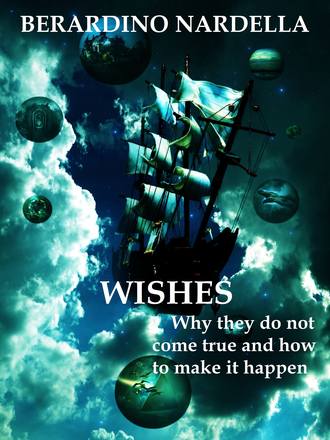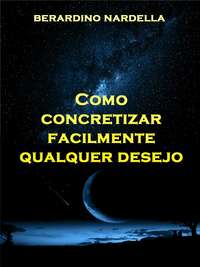
Полная версия
Wishes

Berardino Nardella

The author does not provide any medical advice nor does he prescribe the use of any of the methods contained in this book as a treatment for physical, psychological or medical issues without the opinion of a doctor or a professional, both directly and indirectly.
The aim is that of providing general information for the pursuit of physical, emotional and mental welfare.
Should you exert your right to make use of the information contained in this book, the author reserves the right not to be responsible for your actions.
Cover artwork:
"Ship of dreams" by Thomas Budach
Editing and proofreading by Marianna Rossi
table of contents
WHAT THIS BOOK IS ABOUT
PART ONE WHY OUR DREAMS DO NOT COME TRUE
WISHES AS THE ENGINE OF LIFE
CARPE DIEM
FAITH OR CONFIDENT EXPECTATION
LIMITING CERTAINTIES
FOCUS AND MENTAL ATTITUDE
PATIENCE AND PERSEVERANCE
SELF-LOVE
MINE OR OTHERSâ?
DO I ACTUALLY WANT IT?
CAN I DO IT?
I WILL OR PROCRASTINATION
THE UKNOWN AND ITS MYSTERIES
FAILURE
STATES OF MIND OR BEING ABLE TO LAUGH
PART TWO HOW TO MAKE OUR WISHES COME TRUE
AWARE AWARENESS
LOGBOOK
PURPOSE LOG
SELF-CONDITIONING
THE QUESTION METHOD
â¦AND TO CONCLUDE...
BIBLIOGRAPHY
Credits
I imagine a world where everyone lives in happiness and peace,
where everyone can succeed and make their dreams come true,
where everyone can express their uniqueness and contribute to the beauty of the universe.
My vision is believing it â
My mission is trying to.
Berardino Nardella
WHAT THIS BOOK IS ABOUT
"The sea lures, kills, moves, scares.
It even makes you laugh sometimes; it disappears every once in a while, disguising as a lake.
It crafts storms , it swallows ships, and gives no answer.
Itâs wise, tender, mighty , itâs unpredictable. Above all, the sea calls." Alessandro Baricco
The aim of this book is providing the necessary means to develop the abilities hidden within every individual.
Each of us is capable of succeeding in everything they long for, of making dreams come true and get what others already got.
What determines failure or success then?
Why is it difficult to get what we desire?
This will be the topic of the book.
It will analyze where and how our behaviour prevents our fulfilment and it will provide useful tools to reorganize our existence and redirect it towards what we want.
We can think of our existence as a sailing ship cutting through the oceans.
We are the captains of that ship and, first of all, we must decide which direction we intend to follow.
Based on what we long for we may have decided to sail through certain seas, to explore new lands, or to go treasure hunting in some far-off places; to seek and go beyond both our limits and those of the world, to visit exotic places or maybe to sail around the globe as well.
Yet if we donât follow any direction we will go on without any goal, ignoring where weâre going to, bereft of enthusiasm or aim.
Conversely, our aim provides us with emotions, ambition, happiness as we approach our destination, and joy throughout the journey.
Understanding that we are the captains of our own ship is of the utmost importance.
We are living our own existence, so we must be the ones sailing our ship towards the goal we decided to reach.
If we let others lead our ship we wonât be able to sail it and it will become impossible to reach the shores we wanted to get to.
If we leave others lead the way, our ship will sail through seas we did not pick for ourselves and we will never know whether that journey will provide us with happiness, joy, satisfaction, and fulfilment.
Moreover, without the control of the ship we will not be able to adjust our direction in case we should see rocks or icebergs which may make the ship get stuck or sink into the ocean.
We could not avoid the looming hurricane on the horizon and we would fatally crash into it.
We would not be able to survive storms and we would end up being at the mercy of what the sea sets aside for us.
To be sure, storms will gather even if we are leading our own ship.
Nevertheless, we will try to avoid them and deal with them in the best way, furling the sails and dropping anchor.
Every storm will provide us with experience and if we will be able to make good use of it we will be prepared to face any upcoming storm.
Storms, winds and bad circumstances will not hold the captain if his purpose is steady, if his aim has become one with his heart and existence.
Sooner or later he will reach his destination.
Whatâs next once we arrive?
It will surely be something that makes us proud and happy, but any true sea dog wonât settle for long.
He will be back on his ship sooner or later, sailing towards new seas, new lands, new treasures and new shores where to drop his anchor.
This is what existence is about. Itâs a journey, a relentless quest for ourselves and our possibilities, an inexhaustible source of chances and discoveries.
We are the captains sailing through waters that represent the world, our own life and everyone elseâs, and we sail on a vessel which represents us as a whole. It is therefore important to care about it and make sure it is always on point.
We donât want it to take on water while weâre sailing the high seas: it would be impossible to reach our destination.
The missing piece in the metaphor of existence is the role of our mind, our crew for the journey.
We refer here to the unconscious mind, some 90% of our brain function we probably arenât even aware of, despite the fact that it underlies every aspect of our being alive, from survival â as it leads the functioning of our own body â to what we call âcharacterâ, the totality of our lived and imagined experiences registered in our brain.
The crew is fundamental for the vessel.
Our captain alone couldnât succeed in his endeavour.
Having a crew of reliable and strong men would make the journey smoother and the challenge feasible instead.
But what if everyone in the crew acted on its own?
What if the tasks werenât clear?
What if anarchy was the rule or if someone wanted to mutiny?
Our vessel would then become uncontrollable and would inevitably shipwreck, swallowed by the waves.
Hence the importance of having a crew working for its commander and the need to instruct them about what to do, to prepare them in order to make them become efficient and expert through continuous work and experience.
The helm, as you might know, constantly needs to be held.
The waves tend to shake it and thus deviate it. It needs someone to adjust it when needed, someone who keeps the direction pointed by our compass.
The captain could surely do that, yet maybe not for the entire journey.
If, as captains, we wouldâve well trained our men, we could sleep safe and sound because we will trust them. We could count on their help because we will know that what we want is their desire too.
Once we get here, we can completely rely on our inner world for help and guidance and trust our loyal crew, no matter what happens on the outside.
This is thus the aim of this book: enabling us to cover the role we are entitled to, that is, the role of the commander and the task of taking care of our ship, leading it were we want to, as well as ruling our crew so that it provides us fundamental support for the trip.
Once we take charge of the role, nothing will stop us from longing, seeking, wanting, being what we want to be, from romantic pirates to adventurers and explorers of the unknown.
Once we realize that the journey has already begun and that itâs never too late to adjust the helm, there is when the actual adventure will start.
It will be up to us to finally decide to live it all.
Once we will set the route our goal will be there waiting for us and the lands weâve been wanting to see will be looking forward to welcoming us.
Maybe someday we will be part of some legends, rising to the Olympus of mythical heroes.
We will be remembered and known as forefathers and weâll possibly discover new continents, whose existence many had long ignored.
May fate and the sea be always on your side in your trip, Captain!
WISHES AS THE ENGINE OF LIFE
âWe are such stuff as dreams are made on, and our little life is rounded with a sleep.â
William Shakespeare
Wishes are our actual strength throughout our life.
Since birth, we come into this world as hollow creatures who are not self-aware and who do not have any conscience about the surrounding reality.
Like any other life form on Earth, the very first part of our existence is completely dominated by our instinct of survival.
This goes also for minerals.
Despite their lack of what from a biological point of view we would call âlifeâ, they struggle continuously to earn their place in the universe and in our existence.
Even among our cells and atoms there is a sort of unconscious instinct of preservation, despite their being part of anindivisibile entirety.
The newborn unconsciously cares about his own survival, the lowest step of the pyramid that Abraham Maslow thought of to represent the hierarchy of human needs in the quest for individual self-fulfilment.
These steps represent the phases of self-fulfilment and in order to reach the top â that is, the maximum degree of an individualâs realization â one must go through the first, most basic and essential stop up until the last one.
At the base of the pyramid are physiological needs such as hunger, thirst, and sleep.
Then, the needs for security and protection; on the third level stays the need for belonging, affection, family.
On the fourth, the need for respect, prestige and success, while the last step deals about oneâs self-realization.
Each need, in order to be fulfilled, requires a particular kind of energy, that we call âwishâ or âdesireâ.
The man will never reach self-fulfilment nor will he cover a prominent role in absence of desire.
If one does not wish for it, he will not even be able to have a family, be surrounded by love or rather feel safe.
As a matter of fact, as far as survival is concerned, desires are automatic and unconscious so that every individual can firmly wish to live before anything else.
Think of sexuality.
Nature made sure that sex could provide everyone with emotion and pleasure of such intensity that it is somehow difficult to renounce it.
All of this comes in the wider picture of the preservation of the species.
Let us go back to our newborn baby.
There will be a moment in the overwhelming tide of information he gets â and that inevitably contribute to mold his own representation of the outside world and of himself â when his personality will begin to take shape.
Personality is the peculiarity that gives uniqueness to that person.
What emerges then through personality, game, through the baby trying the express himself in the context heâs put into?
How does he deal with his whole existence?
Through desire.
Desires originate as the engine of individual existence.
They are born as intentions and they simultaneously develop through intension.
Thus, each of my wishes or desiresis an intention and throughout my whole existence I constantly long for something.
This may sound weird but it actually reflects reality.
We tend to think of desires as something big and imposing, something almost unfeasible or rather unreachable, something we must struggle to get.
Actually, our entire life is based on and is studded with a variety of desires: the wish to appear in a certain way, the wish to be, the wish to act, try or seek; the wish to believe, to create, to know, to possess, and so forth.
This is easily reflected in the way children play, the moment when desires are eager to emerge continuously.
On the other hand, adults tend to conceal their âworld of desiresâ despite their tendency to long for something is far from disappeared.
They manifest only what they judge convenient or suitable for the situation and the people around them in that particular moment.
We can define desire as the engine that drives our being towards directions we choose for ourselves, based upon what we long for.
Wishes pushes people to act.
It determines behaviour and so does the counterpart of desire, that is, what we wish not to happen.
That is a wish as well, and its defined as a negative one as it is something we do not want to come true.
Moreover, it pushes us towards certain situations in order to achieve fulfilment.
Even though this may sound weird, that is exactly what happens quite often.
The fact of thinking about things we donât want to happen and constantly examining them makes our subconscious take us seriously.
This is because it just acts upon our orders, without judging them: if you remember the crew metaphor, the crew does not argue.
It just acts upon the captainâs orders without questioning.
Hence the importance of giving the right orders, a topic we will deal with later.
Each of our actions is always pushed by desire.
If desire wasnât there, we would simply not act at all.
It is clear then that we are not pushed by ANY desire, but only by that or those of greater intensity.
When it comes to the issue of the intensity of desire, the questions we should ask ourselves are whether life is continuously permeated by desire or not and what contributes to make our wishes â from the simplest to the most difficult one â to become reality, or better said, OUR reality.
We might say there are three steps that desires must go through in order to become reality.
The first one is the intensity of desire.
The second one is the confident patience for the wish to come true.
The third one is the persistent and constant will directed towards the desire itself.
At the base of any desire stays its intensity, and the more difficult it is to become true, the more intensity grows together with our longing for it to become reality.
The intensity of desire is the fire that lights the fuse that will make our capabilities ignite, a fundamental element without which our potential bomb could not be triggered at all.
Such intensity will determine the degree to which we will be able to yearn for that desire.
This happens because wishes that come about as temporary whims and just fade away to leave place to other whims wonât ever become reality and will always lack the right amount intensity to translate into reality.
The intensity of desires is what pushes us to fight in order to make them become true, as this is precisely the way we should think about that intensity: as a struggle aimed at conquering what we long for.
However, this strength alone is not enough, as it inexorably wanes if you make mistakes on the second step of realization, that is, the wait for our wish to become true sooner or later, the determination not to give up upon the first hit or the first fall to the ground.
The wait is a mandatory and fundamental step.
Think about the plan to build a house, something that is born out of the desire to have a house with a particular structure.
Once I settle this, the house does not automatically become reality.
It actually needs time to be built and unexpected events might occur during the construction process, something that would affect the initial plan and lengthen the wait.
However, the builder with a steady goal in his mind will not give up against those issues and will eventually get what he longs for.
Whatever the desire is, be it something that implies being in a particular way or getting something from the outside world, the right attitude is believing that the wish will become true sooner or later precisely because we will keep wanting it to.
In other words, I wonât ever get anything if I donât even expect I will be able to get something and if I donât lead my inner world towards a particular destination, through desire.
All of this can easily be misunderstood because, as one might argue: âI want to be richâ â but an old proverb says âHe who lives hopingâ¦â. [1]
Weâre not referring here to simple hope but rather to confident wait.
I know I will get that particular thing because my desire is strong and my will is constantly directed at the achievement of my objective.
To rephrase, a desire is forcefully originated in the realm of thoughts and such desire becomes a confident wait in my feelings which, combined with my will, push towards the direction of its realization.
This is not mere mental conjecture: If we looked at anything that has been invented or to any achieved result, and so forth we would realize that it has all gone through this way.
Everything that exists couldnât have existed at all without the presence of a desire for it to be, first of all on a mental level.
Any idea is born out of desire.
Even Archimedes in his bath tub, when he was hit by the intuition that made him utter âEureka!â, had the wish to discover that thing, otherwise the idea wouldâve simply waned and disappeared in absence of fertile soil and a mind suited to understand and put things in practice.
Self-confidence is the best quality we can master, itâs the fundamental ingredient in order to achieve success in addition to hope (in the sense of optimism), and both must go through rationality.
Without optimism, confidence or hope our energies just die out, we stop fighting and we throw in the towel.
Weâre now arrived at the third necessary step, that of the will constantly directed towards achievement.
Will is an exceptional strength at our disposal and it literally enables us to turn the world upside down.
Will is powerful and unlimited in terms of availability and capability.
This means that if we want something â hence we wish for it in the first place â and if we turn steadily towards what we want we will eventually get it (hereâs the concept of confident wait) exactly because we went through all these necessary steps.
However, will needs something to trigger it and that is nothing but the burning desire.
Hereâs how the circle closes and opens all over again.
Thereâs no escape from this law: if one applies it, the goal will always be achieved, even if â as we said before â things were the other way around.
If we didnât wish for a certain thing (which still makes it a wish), that constant thought turned into confident wait and we also acted through our force of will by wishing that particular thing not to happen at all.
Will is acting concretely in order to turn our wish into reality and it is also what turns the mechanism on.
Most of the people who think they cannot make their wishes come true think so because they long for something passively, just dreaming or imagining it.
They lack the fundamental confidence to believe that wish to be feasible and, as a consequence, they cannot draw from their will in order to act towards the wish itself.
We just need to know this and put it in practice.
If we donât manage to do it, that is because of the presence of elements that frustrate our efforts. Weâll deal with these in the following pages.
Weâll then see what mechanisms trigger within us and sabotage one or all of the steps, preventing us to reach our goals.
[1] The complete translation of the Italian proverb would be âHe who lives hoping will die shittingâ
CARPE DIEM
"Gather ye rosebuds when it's time, that time you know that flies
and the same flower that blooms today tomorrow will wither. "
Walt Whitman
Carpe diem, that is, seize the day.
With this concept we start analyzing what stops or limits our success, our achievements and the positive outcome of our desires.
Carpe Diem is a Latin locution from the Latin poet Horace ( Odes, 1, 11, 8), and its literal translation is â seize the dayâ, often adapted in â seize the momentâ, a phrase which is now of everyday use thanks to the film Dead Poets Society. [1]
To be thorough, we should quote the full sentence, which goes on like this: â â¦quam minimum credula posteroâ, that is, â having the least amount of confidence in tomorrow as possibleâ.
It is an invitation to enjoy what one has and to live each day at our best, as we are not allowed to foresee future.
Such philosophy is based on the assumption that men cannot predict nor determine future.
Man can manage his own life and hence his own time.
As a matter of fact, in the previous verse Horace states: âDum loquimur, fugeritinvidaaetas", "While we talk, the greedy time would have long goneâ.
Every man can act only in and on the present, and is only by living that time that he must seize moments, chances and delights that show up today, without any restriction coming from hypothetical hopes or unsettling worries on the future.






